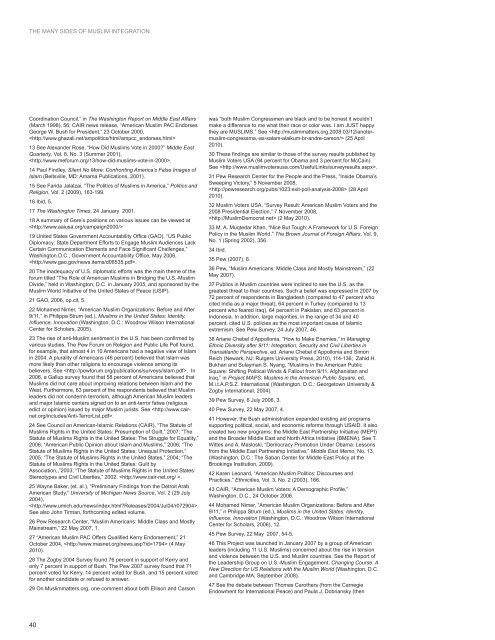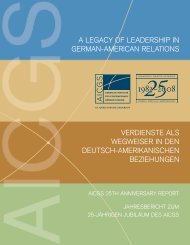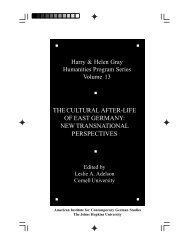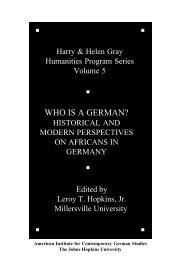the many sides of muslim integration: a german- american - aicgs
the many sides of muslim integration: a german- american - aicgs
the many sides of muslim integration: a german- american - aicgs
Create successful ePaper yourself
Turn your PDF publications into a flip-book with our unique Google optimized e-Paper software.
<strong>the</strong> <strong>many</strong> <strong>sides</strong> <strong>of</strong> <strong>muslim</strong> <strong>integration</strong><br />
Coordination Council,” in The Washington Report on Middle East Affairs<br />
(march 1998), 56; Cair news release, “<strong>american</strong> <strong>muslim</strong> PaC endorses<br />
george W. Bush for President,” 23 october 2000,<br />
<br />
13 see alexander rose, “how did <strong>muslim</strong>s Vote in 2000?” Middle East<br />
Quarterly, Vol. 8, no. 3 (summer 2001),<br />
.<br />
14 Paul findley, Silent No More: Confronting America’s False Images <strong>of</strong><br />
Islam (Beltsville, md: amama Publications, 2001).<br />
15 see farida Jalalzai, “<strong>the</strong> Politics <strong>of</strong> <strong>muslim</strong>s in america,” Politics and<br />
Religion, Vol. 2 (2009), 163-199.<br />
16 ibid, 5.<br />
17 The Washington Times, 24 January 2001.<br />
18 a summary <strong>of</strong> gore’s positions on various issues can be viewed at<br />
<br />
19 united states government accountability <strong>of</strong>fice (gao), “us Public<br />
diplomacy: state department efforts to engage <strong>muslim</strong> audiences lack<br />
Certain Communication elements and face significant Challenges,”<br />
Washington d.C., government accountability <strong>of</strong>fice, may 2006,<br />
.<br />
20 <strong>the</strong> inadequacy <strong>of</strong> u.s. diplomatic efforts was <strong>the</strong> main <strong>the</strong>me <strong>of</strong> <strong>the</strong><br />
forum titled “<strong>the</strong> role <strong>of</strong> <strong>american</strong> <strong>muslim</strong>s in Bridging <strong>the</strong> u.s.-<strong>muslim</strong><br />
divide,” held in Washington, d.C. in January 2005, and sponsored by <strong>the</strong><br />
<strong>muslim</strong> World initiative <strong>of</strong> <strong>the</strong> united states <strong>of</strong> Peace (usiP).<br />
21 gao, 2006, op.cit, 5.<br />
22 mohamed nimer, “<strong>american</strong> <strong>muslim</strong> organizations: Before and after<br />
9/11,” in Philippa strum (ed.), Muslims in <strong>the</strong> United States: Identity,<br />
Influence, Innovation (Washington, d.C.: Woodrow Wilson international<br />
Center for scholars, 2005).<br />
23 <strong>the</strong> rise <strong>of</strong> anti-<strong>muslim</strong> sentiment in <strong>the</strong> u.s. has been confirmed by<br />
various studies. <strong>the</strong> Pew forum on religion and Public life Poll found,<br />
for example, that almost 4 in 10 <strong>american</strong>s had a negative view <strong>of</strong> islam<br />
in 2004. a plurality <strong>of</strong> <strong>american</strong>s (46 percent) believed that islam was<br />
more likely than o<strong>the</strong>r religions to encourage violence among its<br />
believers. see . in<br />
2006, a gallup survey found that 58 percent <strong>of</strong> <strong>american</strong>s believed that<br />
<strong>muslim</strong>s did not care about improving relations between islam and <strong>the</strong><br />
West. fur<strong>the</strong>rmore, 63 percent <strong>of</strong> <strong>the</strong> respondents believed that <strong>muslim</strong><br />
leaders did not condemn terrorism, although <strong>american</strong> <strong>muslim</strong> leaders<br />
and major islamic centers signed on to an anti-terror fatwa (religious<br />
edict or opinion) issued by major <strong>muslim</strong> jurists. see .<br />
24 see Council on <strong>american</strong>-islamic relations (Cair), “<strong>the</strong> statute <strong>of</strong><br />
<strong>muslim</strong>s rights in <strong>the</strong> united states: Presumption <strong>of</strong> guilt,” 2007; “<strong>the</strong><br />
statute <strong>of</strong> <strong>muslim</strong>s rights in <strong>the</strong> united states: <strong>the</strong> struggle for equality,”<br />
2006; “<strong>american</strong> Public opinion about islam and <strong>muslim</strong>s,” 2006; “<strong>the</strong><br />
statute <strong>of</strong> <strong>muslim</strong>s rights in <strong>the</strong> united states: unequal Protection,”<br />
2005; “<strong>the</strong> statute <strong>of</strong> <strong>muslim</strong>s rights in <strong>the</strong> united states,” 2004; “<strong>the</strong><br />
statute <strong>of</strong> <strong>muslim</strong>s rights in <strong>the</strong> united states: guilt by<br />
association,,”2003; “<strong>the</strong> statute <strong>of</strong> <strong>muslim</strong>s rights in <strong>the</strong> united states:<br />
stereotypes and Civil liberties,” 2002, .<br />
25 Wayne Baker, (et. al.), “Preliminary findings from <strong>the</strong> detroit arab<br />
<strong>american</strong> study,” University <strong>of</strong> Michigan News Source, Vol. 2 (29 July<br />
2004),<br />
.<br />
see also John tirman, forthcoming edited volume.<br />
26 Pew research Center, “<strong>muslim</strong> <strong>american</strong>s: middle Class and mostly<br />
mainstream,” 22 may 2007, 1.<br />
27 “<strong>american</strong> <strong>muslim</strong> PaC <strong>of</strong>fers Qualified Kerry endorsement,” 21<br />
october 2004, (4 may<br />
2010).<br />
28 <strong>the</strong> Zogby 2004 survey found 76 percent in support <strong>of</strong> Kerry and<br />
only 7 percent in support <strong>of</strong> Bush. <strong>the</strong> Pew 2007 survey found that 71<br />
percent voted for Kerry, 14 percent voted for Bush, and 15 percent voted<br />
for ano<strong>the</strong>r candidate or refused to answer.<br />
29 on <strong>muslim</strong>matters.org, one comment about both ellison and Carson<br />
40<br />
was “both <strong>muslim</strong> Congressmen are black and to be honest it wouldn’t<br />
make a difference to me what <strong>the</strong>ir race or color was. i am Just happy<br />
<strong>the</strong>y are <strong>muslim</strong>s.” see <br />
(25 april<br />
2010).<br />
30 <strong>the</strong>se findings are similar to those <strong>of</strong> <strong>the</strong> survey results published by<br />
<strong>muslim</strong> Voters usa (94 percent for obama and 3 percent for mcCain).<br />
see .<br />
31 Pew research Center for <strong>the</strong> People and <strong>the</strong> Press, “inside obama’s<br />
sweeping Victory,” 5 november 2008,<br />
(28 april<br />
2010).<br />
32 <strong>muslim</strong> Voters usa, “survey result: <strong>american</strong> <strong>muslim</strong> Voters and <strong>the</strong><br />
2008 Presidential election,” 7 november 2008,<br />
(2 may 2010).<br />
33 m. a. muqtedar Khan, “nice But tough: a framework for u.s. foreign<br />
Policy in <strong>the</strong> <strong>muslim</strong> World,” The Brown Journal <strong>of</strong> Foreign Affairs, Vol. 9,<br />
no. 1 (spring 2002), 356.<br />
34 ibid.<br />
35 Pew (2007), 8.<br />
36 Pew, “<strong>muslim</strong> <strong>american</strong>s: middle Class and mostly mainstream,” (22<br />
may 2007).<br />
37 Publics in <strong>muslim</strong> countries were inclined to see <strong>the</strong> u.s. as <strong>the</strong><br />
greatest threat to <strong>the</strong>ir countries. such a belief was expressed in 2007 by<br />
72 percent <strong>of</strong> respondents in Bangladesh (compared to 47 percent who<br />
cited india as a major threat), 64 percent in turkey (compared to 13<br />
percent who feared iraq), 64 percent in Pakistan, and 63 percent in<br />
indonesia. in addition, large majorities, in <strong>the</strong> range <strong>of</strong> 34 and 40<br />
percent, cited u.s. policies as <strong>the</strong> most important cause <strong>of</strong> islamic<br />
extremism. see Pew survey, 24 July 2007, 46.<br />
38 ariane Chebel d’appollonia, “how to make enemies,” in Managing<br />
Ethnic Diversity after 9/11: Integration, Security and Civil Liberties in<br />
Transatlantic Perspective, ed. ariane Chebel d’appollonia and simon<br />
reich (newark, nJ: rutgers university Press, 2010), 114-136; Zahid h.<br />
Bukhari and sulayman s. nyang, “<strong>muslim</strong>s in <strong>the</strong> <strong>american</strong> Public<br />
square: shifting Political Winds & fallout from 9/11, afghanistan and<br />
iraq,” in Project MAPS: Muslims in <strong>the</strong> American Public Square, ed.<br />
m.i.t.a.P.s.Z. international (Washington, d.C.: georgetown university &<br />
Zogby international, 2004).<br />
39 Pew survey, 6 July 2006, 3.<br />
40 Pew survey, 22 may 2007, 4.<br />
41 however, <strong>the</strong> Bush administration expanded existing aid programs<br />
supporting political, social, and economic reforms through usaid. it also<br />
created two new programs: <strong>the</strong> middle east Partnership initiative (mePi)<br />
and <strong>the</strong> Broader middle east and north africa initiative (Bmena). see t.<br />
Wittes and a. masloski, “democracy Promotion under obama: lessons<br />
from <strong>the</strong> middle east Partnership initiative,” Middle East Memo, no. 13,<br />
(Washington, d.C.: <strong>the</strong> saban Center for middle east Policy at <strong>the</strong><br />
Brookings institution, 2009).<br />
42 Karen leonard, “<strong>american</strong> <strong>muslim</strong> Politics: discourses and<br />
Practices,” Ethnicities, Vol. 3, no. 2 (2003), 166.<br />
43 Cair, “<strong>american</strong> <strong>muslim</strong> Voters: a demographic Pr<strong>of</strong>ile,”<br />
Washington, d.C., 24 october 2006.<br />
44 mohamed nimer, “<strong>american</strong> <strong>muslim</strong> organizations: Before and after<br />
9/11,” n Philippa strum (ed.), Muslims in <strong>the</strong> United States: Identity,<br />
Influence, Innovation (Washington, d.C.: Woodrow Wilson international<br />
Center for scholars, 2006), 12.<br />
45 Pew survey, 22 may 2007, 54-5.<br />
46 this Project was launched in January 2007 by a group <strong>of</strong> <strong>american</strong><br />
leaders (including 11 u.s. <strong>muslim</strong>s) concerned about <strong>the</strong> rise in tension<br />
and violence between <strong>the</strong> u.s. and <strong>muslim</strong> countries. see <strong>the</strong> report <strong>of</strong><br />
<strong>the</strong> leadership group on u.s.-<strong>muslim</strong> engagement, Changing Course. A<br />
New Direction for US Relations with <strong>the</strong> Muslim World (Washington, d.C.<br />
and Cambridge ma, september 2008).<br />
47 see <strong>the</strong> debate between thomas Caro<strong>the</strong>rs (from <strong>the</strong> Carnegie<br />
endowment for international Peace) and Paula J. dobriansky (<strong>the</strong>n





